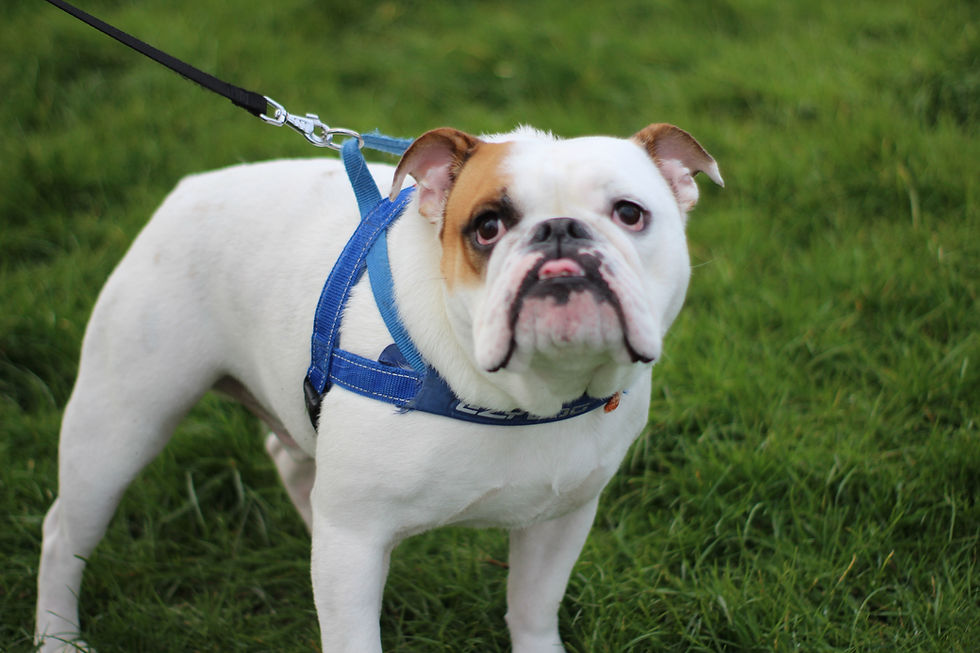Help! My Dog Has Anxiety: Calming Tips & Tricks
- Maris Miller
- Apr 25, 2024
- 4 min read
Updated: May 23, 2024
Mental health is a topic that is getting a lot of attention, both in humans and in our pets. It is estimated that the pandemic brought on a 25% increase in the prevalence of anxiety and depression in people worldwide. For obvious reasons, the numbers are not as easy to grasp in dogs, but it’s clear that anxiety in dogs is a growing problem. Today, we're sharing Help! My Dog Has Anxiety: Calming Tips & Tricks to help you recognize and manage anxiety in your beloved canine companion.
Help! My Dog Has Anxiety: Anxiety in dogs explained

According to the American Kennel Club, dog anxiety can affect all breeds but affects each dog differently. While anxiety is an emotion that all sentient beings experience from time to time, disproportionate levels of anxiety that are left unaddressed may result in a chronic anxiety disorder. When left untreated, dog anxiety can lead to behavioral problems, reactivity, aggression, bites, etc.
Help! My Dog Has Anxiety: Common Types of Anxiety in dogs
Fear-Related Anxiety in dogs

Fear-Related Anxiety is an umbrella term that covers various types of anxiety including noise phobia like storms and fireworks, shelter anxiety, "stranger danger," vet visits, car rides, visual stimuli, surfaces, etc. Dogs that appear skittish, shy, and under-socialized are oftentimes dogs with fear-related anxiety.
Separation Anxiety in dogs
According to Malena DeMartini, an expert in Separation Anxiety in Dogs, “risk factors [for separation anxiety] are infinite and not entirely known. It is, however, estimated that almost 20% of pet dogs suffer from separation anxiety, which is anxiety that manifests when a dog is left alone or separated from its family."
Aging-Related Anxiety in dogs
Per the AKC, aging-related anxiety “affects older dogs and can be associated with cognitive dysfunction syndrome (CDS). In dogs with CDS, memory, learning, perception, and awareness start to decline, similar to the early stages of Alzheimer’s disease in humans.” Aging dogs often become disoriented, start losing their faculties, and therefore become anxious and unnerved by their inability to navigate their environment and respond to threats.
Help! My Dog Has Anxiety: Symptoms of Anxiety in dogs
Because, often, canine anxiety and communication are not fully understood, it can be hard for pet parents to recognize symptoms of anxiety in their dogs. The vast majority of experts recommend looking for the following signs as possible symptoms of anxiety:
Reactivity and/or aggression
Urinating or defecating frequently/improperly
Drooling and panting
Destructive behavior
Depression and/or lethargy
Excessive barking
Pacing and/or restlessness
Repetitive or compulsive behaviors
Appeasement signals like lip-licking or yawning
Help! My Dog Has Anxiety: Managing Anxiety in dogs

Anxiety in dogs is more common than most people think. For this reason, it’s important to get a veterinary evaluation to confirm suspected anxiety in your canine companion. It’s also a good idea to get a blood panel and full physical examination performed on your dog to rule out pain, injury, or illness that may be causing behaviors that may mimic anxiety.
Once canine anxiety is confirmed, you can start addressing and/or managing symptoms with the help of a dog trainer or behavior consultant. Dog trainers that use positive reinforcement and reward-based techniques are our favorite choice because they approach the situation with compassion and patience while making behavior modification fun for the dog. Fear Free Professionals are an excellent option for dogs in need of confidence boosting and coping skills.
Difficult cases of anxiety may require pharmaceutical intervention during behavior modification to bring the dog to a level where they are receptive to training. If the dog is in a highly anxious state, learning will be slow and possibly damaging. Veterinary Behaviorists are veterinarians that specialize in behavior and can be a tremendous resource for families with dogs that have severe anxiety. We also recommend Malena DeMartini's Mission Possible Course for pet parents dealing with separation anxiety specifically.
Help! My Dog Has Anxiety: trust us with your anxious dog

Dogs that experience anxiety greatly benefit from regular exercise and loving company while their families are away for work or traveling. Our dog walking and dog adventure services offer a great way for anxious dogs to enjoy much-needed exercise on a regular schedule, allowing them to fall into a physically and mentally beneficial routine. Dogs that are walked regularly relieve stress by interacting with their environment, engaging their sniffing nose and enjoying nature, which may alleviate anxiety symptoms.

When traveling leaving anxious dogs at home is the best option because they remain in their safe, home environment. If your dog suffers from anxiety, please let us know so that we may design a consistent care schedule that meets their needs. From multiple visits per day to "almost overnights," we are happy to work with you and your dog to ensure they can safely stay home while you travel for work or for play.
To learn more about our dog walking, dog adventure, and pet sitting services, contact us at
(314) 690-5154 or email Houseofpawspetcarellc@gmail.com. If you're ready to book services in one of our service areas submit a new client form to begin our registration process.
House of Paws proudly serves Eureka, Wildwood, Ballwin, Manchester, Maryland Heights, Des Peres, Fenton, Chesterfield, Valley Park, Ladue, Creve Couer, Town & Country, Kirkwood, Sunset Hills, Clayton, Webster Groves, Maplewood, The Hill, South City & Affton.
We look forward to caring for your paws-itively perfect dogs(s)!






Comments